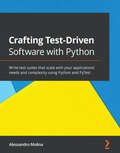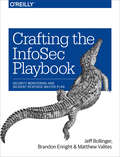- Table View
- List View
Crafting Test-Driven Software with Python: Write test suites that scale with your applications' needs and complexity using Python and PyTest
by Alessandro MolinaGet to grips with essential concepts and step-by-step explanations to apply TDD practices to your Python projects while keeping your test suite under controlKey FeaturesBuild robust Python applications using TDD and BDD methodologiesTest Python web applications using WebTest and web frameworksLeverage PyTest to implement stringent testing mechanisms to ensure fault-tolerant applicationsBook DescriptionTest-driven development (TDD) is a set of best practices that helps developers to build more scalable software and is used to increase the robustness of software by using automatic tests. This book shows you how to apply TDD practices effectively in Python projects. You'll begin by learning about built-in unit tests and Mocks before covering rich frameworks like PyTest and web-based libraries such as WebTest and Robot Framework, discovering how Python allows you to embrace all modern testing practices with ease. Moving on, you'll find out how to design tests and balance them with new feature development and learn how to create a complete test suite with PyTest. The book helps you adopt a hands-on approach to implementing TDD and associated methodologies that will have you up and running and make you more productive in no time. With the help of step-by-step explanations of essential concepts and practical examples, you'll explore automatic tests and TDD best practices and get to grips with the methodologies and tools available in Python for creating effective and robust applications. By the end of this Python book, you will be able to write reliable test suites in Python to ensure the long-term resilience of your application using the range of libraries offered by Python for testing and development.What you will learnFind out how tests can make your life easier as a developer and discover related best practicesExplore PyTest, the most widespread testing framework for PythonGet to grips with the most common PyTest plugins, including coverage, flaky, xdist, and pickedWrite functional tests for WSGI web applications with WebTestRun end-to-end tests for web applications using Robot FrameworkUnderstand what test-driven development means and why it is importantDiscover how to use the range of tools available in PythonBuild reliable and robust applicationsWho this book is forThis book is for Python developers looking to get started with test-driven development and developers who want to learn about the testing tools available in Python. Developers who want to create web applications with Python and plan to implement TDD methodology with PyTest will find this book useful. Basic knowledge of Python programming is required.
Crafting the InfoSec Playbook: Security Monitoring and Incident Response Master Plan
by Matthew Valites Brandon Enright Jeff BollingerAny good attacker will tell you that expensive security monitoring and prevention tools aren’t enough to keep you secure. This practical book demonstrates a data-centric approach to distilling complex security monitoring, incident response, and threat analysis ideas into their most basic elements. You’ll learn how to develop your own threat intelligence and incident detection strategy, rather than depend on security tools alone.Written by members of Cisco’s Computer Security Incident Response Team, this book shows IT and information security professionals how to create an InfoSec playbook by developing strategy, technique, and architecture.Learn incident response fundamentals—and the importance of getting back to basicsUnderstand threats you face and what you should be protectingCollect, mine, organize, and analyze as many relevant data sources as possibleBuild your own playbook of repeatable methods for security monitoring and responseLearn how to put your plan into action and keep it running smoothlySelect the right monitoring and detection tools for your environmentDevelop queries to help you sort through data and create valuable reportsKnow what actions to take during the incident response phase
Crafty Game Writing: Secrets of Great Videogame Narrative
by Alex EpsteinEvery writer dreams of creating their own game world and telling their own stories. But creating a new game from scratch is different from working on an established franchise. If you’re writing for Star Wars or Assassin’s Creed or the Marvel Universe, the groundwork has already been laid for you. But what if you are the person who has to lay that groundwork? Where do you start? How do you decide which, among the endless story options, is the right one? How do you create a story that plays nice with the gameplay and pulls the player in?Alex Epstein, an experienced narrative director who has worked on half a dozen new IPs, takes you step by step through the process of creating compelling new worlds and characters that feel real.Of course, many challenges are the same, whether you’re creating your own game or working within a franchise. How do you make players think they have maximum freedom when they absolutely do not? What makes players inhabit a game story, not just skip past it? How can "dirty narrative" (a term Epstein coined) increase player engagement?Packed with practical tips, Crafty Game Writing: Secrets of Great Videogame Narrative will help you understand the invisible infrastructure of player‑pulled storytelling for video games – whether you aspire to make your own indie game or create the Next Big Thing for a AAA studio.Features: This book is packed with tools to help the writer not only know what to write, but also how to write it well The author has created the narrative for half a dozen entirely new games (not based on prior IP) and discusses how to build characters and worlds out of nothing. (Note: most video game writers, including game writing book writers, have worked in franchises) This book includes the semi‑heretical "dirty narrative" writing technique, using mysteries, absences, and translucent liars to pull the player into engagement with the game world and story
Crash Override: How Gamergate (Nearly) Destroyed My Life, and How We Can Win the Fight Against Online Hate
by Zoe Quinn<P>You've heard the stories about the dark side of the internet--hackers, #gamergate, anonymous mobs attacking an unlucky victim, and revenge porn--but they remain just that: stories. Surely these things would never happen to you. <P>Zoe Quinn used to feel the same way. She is a video game developer whose ex-boyfriend published a crazed blog post cobbled together from private information, half-truths, and outright fictions, along with a rallying cry to the online hordes to go after her. They answered in the form of a so-called movement known as #gamergate--they hacked her accounts; stole nude photos of her; harassed her family, friends, and colleagues; and threatened to rape and murder her. But instead of shrinking into silence as the online mobs wanted her to, she raised her voice and spoke out against this vicious online culture and for making the internet a safer place for everyone. <P>In the years since #gamergate, Quinn has helped thousands of people with her advocacy and online-abuse crisis resource Crash Override Network. From locking down victims' personal accounts to working with tech companies and lawmakers to inform policy, she has firsthand knowledge about every angle of online abuse, what powerful institutions are (and aren't) doing about it, and how we can protect our digital spaces and selves. <P>Crash Override offers an up-close look inside the controversy, threats, and social and cultural battles that started in the far corners of the internet and have since permeated our online lives. Through her story--as target and as activist--Quinn provides a human look at the ways the internet impacts our lives and culture, along with practical advice for keeping yourself and others safe online.
Crayons and iPads: Learning and Teaching of Young Children in the Digital World (SAGE Swifts)
by Dr Debra HarwoodCrayons and iPads examines the use of digital technology in the early stages of child development, and the way in which learning techniques have evolved in classrooms across the world. Harwood explores how tablets can be used to provoke, ignite and excite children’s interest in the world around them, performing as accessible learning and instructional tools, and argues that it is through this engagement with technology that new discoveries are made and learning takes place. Guiding readers through research-based insights into children’s thinking, interactions and being, Crayons and iPads offers an important starting point upon which to build play and inquiry-based learning opportunities within early learning programs, and will appeal to both educators and researchers across child development, early years education, and digital literacy.
Crayons and iPads: Learning and Teaching of Young Children in the Digital World (SAGE Swifts)
by Dr. Debra HarwoodCrayons and iPads examines the use of digital technology in the early stages of child development, and the way in which learning techniques have evolved in classrooms across the world. Harwood explores how tablets can be used to provoke, ignite and excite children&’s interest in the world around them, performing as accessible learning and instructional tools, and argues that it is through this engagement with technology that new discoveries are made and learning takes place. Guiding readers through research-based insights into children&’s thinking, interactions and being, Crayons and iPads offers an important starting point upon which to build play and inquiry-based learning opportunities within early learning programs, and will appeal to both educators and researchers across child development, early years education, and digital literacy.
Crea il tuo blog vincente
by Valeria Bragante Rafa OsunaCrea il tuo blog vincente di Rafa Osuna Letture che ti aiuteranno a creare un blog di successo. Stai pensando di cominciare a scrivere in un blog o ne hai già uno e non ti è chiaro cosa fare? In questo caso, questo libro è per te. Cosa troverai in questo libro? O meglio... che ne pensi se comincio a dirti cosa non troverai? In questo libro non troverai filosofia a buon mercato riguardo i blog. Quella che tentano di venderti le persone che non hai mai avuto successo con un blog. In questo libro non troverai un corso tecnico su come iniziare un blog. Oggi le piattaforme di creazione di blog sono così intuitive e facili da usare che non vale la pena perdere tempo leggendo un libro su questo. Se cerchi questo, ti raccomando qualcuno dei tanti tutorials che ci sono in Youtube su questo tema. Cerca in Internet. Non troverai nemmeno formule magiche per diventare milionario in due settimane con il tuo blog. Se qualcuno ti offre una cosa del genere, scappa immediatamente. Quello che troverai in questo libro è un breve riassunto di ciò che ho scritto nel mio blog personale ((El Último Blog) durante gli ultimi dieci anni. 10 anni nei quali non solo ho continuato il mio blog ma ho diretto una rete di blog con più di 50 redattori, ho partecipato a blog collaborativi, ho tenuto conferenze e corsi sui blog, ho partecipato a varie pubblicazioni. Ciò che ho voluto offrirti in questo libro, come riassunto di questi 10 anni di blogging, è una scelta dei 15 articoli che credo riflettano in modo chiaro e conciso tutto ciò di cui hai bisogno per avere successo con il tuo blog. Sono 15 articoli che ho scelto tra più dei 2000 che ho pubblicato in questi anni. Articoli che ho adattato per la pubblicazione in questo libro, in modo che, mantenendo la freschezza di un post, avessero un certo collegamento tra loro. In questo modo, spero di essere riuscito, con alcune letture veloci, tipiche dei post di
Crea: Una guía poco ortodoxa para hacer cosas que marquen la diferencia
by Tony Fadell«He colaborado en cambiar el mundo dos veces: con el iPod y con el iPhone. Ahora quiero la oportunidad de hacerlo por tercera vez» - TONY FADELL Una guía poco ortodoxa para crear innovaciones que marquen la diferencia, de mano del padre del iPod y el iPhone. Tony Fadell es un mito de la innovación y comparte en estas páginas su experiencia y su aprendizaje en algunas de las más destacadas compañías de los últimos treinta años, como Apple, Nest y Google, en el desarrollo de productos tecnológicos. En este libro, estructurado como una enciclopedia, recoge todo lo que ha aprendido: lecciones sobre liderazgo, innovación, pensamiento disruptivo, emprendimiento, éxito y fracaso, combinadas con historias personales de su carrera y de su trabajo con figuras de la talla de Steve Jobs o Larry Page. Un relato en primera persona de una época crucial, un retrato íntimo de algunos de los líderes más destacados de los últimos treinta años. Un legado para los genios del mañana. Reseñas:«Tony Fadell es uno de los grandes expertos mundiales en fundar compañías y crear productos increíblemente geniales. Este libro destila su sabiduría y aporta orientación en un conjunto de historias apasionantes».Walter Isaacson, autor y biógrafo de Steve Jobs, Albert Einstein y Leonardo da Vinci «Tony Fadell ha creado más cosas geniales que nadie en toda la historia de Silicon Valley, y en Crea nos explica cómo lo ha hecho. Es la biografía más divertida y fascinante sobre curiosidad e ingenio que he leído nunca».Malcolm Gladwell, autor de Fuera de serie y Hablar con extraños «Basándose en su propia y difícil experiencia como emprendedor, Tony Fadell ofrece en Crea consejos valiosos para cualquier joven que quiera construir algo magnífico o cambiar el mundo para mejor. Ojalá yohubiera leído este libro cuando tenía veintiún años».Ben Horowitz, socio fundador de Andreessen Horowitz «Revelador. Divertido. Instructivo. Sin adornos. En este libro, lleno de energía y entusiasmo, Tony Fadell, creador de productos que han definido épocas enteras, hace uso de su experiencia con el éxito y el fracaso para ayudarte en todos los pasos de tu carrera».Joanna Hoffman, exvicepresidenta de marketing de General Magic y miembro del equipo original de Macintosh «Tony Fadell resume su épica carrera en un conjunto de consejos claros, y a menudo opuestos, que puedes poner en práctica de inmediato. Tanto si buscas crear un gran producto, como si aspiras a crear un equipo creativo, una cultura más sólida o una carrera con más significado, la guía de Tony te hará pensar y repensar».Adam Grant, autor de Piénsalo otra vez y Originales
Create 2D Mobile Games with Corona SDK: For iOS and Android
by David MekersaCorona SDK is one of the most powerful tools used to create games and apps for mobile devices. The market requires speed; new developers need to operate quickly and efficiently. Create 2D Mobile Games with Corona SDK gives you the tools needed to master Corona - even within the framework of professional constraints. A must-read guide, this book gives you fast, accurate tips to learn the programming language necessary to create games. Read it sequentially or as an FAQ and you will have the tools you need to create any base game before moving on to advanced topics. The tutorial-based format: Contains step-by-step directions complete with coding and screenshots Is filled with tutorials, tips, and links to useful online resources Includes a comprehensive companion website featuring online exercise files to practice coding, full build samples from the text, additional book details, and more!
Create Computer Games: Design and Build Your Own Game
by Patrick McCabePUT DOWN YOUR CONTROLLER Why just play videogames when you can build your own game? Follow the steps in this book to learn a little about code, build a few graphics, and piece together a real game you can share with your friends. Who knows? What you learn here could help you become the next rock-star video- game designer. So set your controller aside and get ready to create! Decipher the code – build some basic knowledge of how computer code drives videogames Get animated – create simple graphics and learn how to put them in motion Update a classic – put your knowledge together to put your modern twist on a classic game
Create Dynamic Charts in Microsoft® Office Excel® 2007 and Beyond
by Reinhold ScheckExtend your Excel 2007 skills--and create more-powerful and compelling charts in less time. Guided by an Excel expert, you'll learn how to turn flat, static charts into dynamic solutions--where you can visualize and manipulate data countless ways with a simple mouse click. Get the hands-on practice and examples you need to produce your own, professional-quality results. No programming required! Maximize the impact of your ideas and data! Learn how your design decisions affect perception and comprehension Match the right chart type to your communication objective Visualize--then build--your solution using the author's five-step approach Apply the science of color to make the right things pop Add controls--such as drop-down lists and scroll bars--without coding Use conditional formatting to dynamically highlight and analyze data Unleash your chart-making creativity--and bring numbers to life! CD includes: More than 150 sample, customizable charts for various business scenarios Helpful worksheets and job aids Bonus content and resources Fully searchable eBook A Note Regarding the CD or DVD The print version of this book ships with a CD or DVD. For those customers purchasing one of the digital formats in which this book is available, we are pleased to offer the CD/DVD content as a free download via OReilly Medias Digital Distribution services. To download this content, please visit OReillys web site, search for the title of this book to find its catalog page, and click on the link below the cover image (Examples, Companion Content, or Practice Files). Note that while we provide as much of the media content as we are able via free download, we are sometimes limited by licensing restrictions. Please direct any questions or concerns to booktech@oreilly.com.
Create Rapid Web Applications in Oracle Application Express 19: A platform to develop stunning, scalable data-centric web apps fast
by Riaz AhmedThis book introduces you to the art of building web applications by iteratively developing the sample database application (provided with Oracle APEX) from scratch. The application demonstrates how to display summary information, use reports and forms for viewing, updating, and adding information, include charts and maps to visualize information, and create dedicated mobile pages. Oracle APEX is an amazing development platform in which you can build robust web applications. Not only it provides an environment where you can rapidly develop data-centric web applications, it also allows end-users to interact with their data via tools like interactive report, interactive grid, different types of charts, maps and more. This book helps absolute beginners who wish to learn from self-paced professional guidance and need a solid foundation in Oracle APEX.
Create React App 2 Quick Start Guide: Build React applications faster with Create React App
by Brandon RicheyIntegrate your React applications with React to build efficient web services.Key FeaturesLearn React by building applications with Create React AppCreate interactive UIs exploring the latest feature of CRA 2.0Build Progressive Web Applications for a more seamless webBook DescriptionIf you're a power user and you aren’t happy always reusing default configurations, from previous applications with each new application, then all you need is Create React App (CRA), a tool in the React ecosystem designed to help you create boilerplate code for building a web frontend.This book will help you use CRA to write React programs without significant configuration-related difficulties. With this quick start guide, you will integrate your applications with React to build efficient professional web services.You will learn to design UIs with the features of CRA and template your React applications.By the end of the book, you will be sufficiently skilled to be able to build faster and effective React apps using CRA.What you will learnBecome familiar with React by building applications with Create React AppMake your frontend development hassle freeCreate interactive UIs exploring the latest features of CRA 2Build modern, React projects with, SASS,and progressive web applicationsDevelop proxy backend servers and simulate interaction with a full backendKeep your application fully tested and maintain confidence in your projectWho this book is forThe book is intended for the web developers who want to jump into building great frontend with React using easy templating solutions.
Create Stunning Animations Using Corona and V-Ray in 3ds Max: Guiding the Next Generation of 3D Renderers
by Margarita NikitaThis book is a step-by-step guide on how to create realistic animations using Corona and V-Ray within 3ds Max. It caters to beginners and intermediate users, helping them transform static renders into dynamic and captivating animations. It combines technical knowledge with practical examples, covering everything from basic principles to advanced techniques.By the end of this book, readers will: Understand the fundamentals of animation in 3ds Max Learn to animate cameras, objects, and lights effectively Create realistic animated scenes using Corona and V-Ray Explore time-saving workflows and rendering optimization tips Develop a polished animation portfolio ready for professional projects This book is structured as a nuts-and-bolts how-to guide, breaking down complex animation techniques into manageable steps. Each chapter focuses on a specific aspect of animation, blending foundational knowledge with advanced tips to enhance the reader’s understanding and capability. Through detailed explanations, visual examples, and step-by-step tutorials, this book aims to demystify the animation process for beginners while offering advanced insights for experienced users.
Create Stunning HTML Email That Just Works: Create HTML5 Emails That Look Great and Deliver!
by Mathew PattersonCreate Stunning HTML Email That Just Works is a step-by-step guide to creating beautiful HTML emails that consistently work. It begins with an introduction to email covering topics such as: how email design differs from web design; permission based marketing, and the anatomy of an email. What You Will Learn:How to design HTML emails that look greatSimple methods to design & test email newslettersBest practice, permission based email marketing tips & techniquesProven strategies for selling email design services to your clientsThe book shows the reader how to plan, design, and build gorgeous HTML email designs that look great in every email program: Outlook, Gmail, Apple Mail, etc. All-important tasks like legal requirements, testing, spam compliance and known hacks and workarounds are covered.
Create Stunning Renders Using Corona in 3ds Max: Guiding the Next Generation of 3D Renderers
by Margarita NikitaThis book is a comprehensive step‑by‑step guide tailored for designers seeking to elevate their visualization skills using the powerful combination of Corona 11 in 3ds Max 2024.It begins by acquainting readers with the 3ds Max interface and fundamental commands, ensuring a solid foundation for navigating the software. Readers will be guided through the process of assigning Corona and fine‑tuning rendering settings, setting up cameras, and mastering both natural and artificial lighting techniques within their scenes.It then progresses to the creation of materials, their application to the scene, and the utilization of Corona’s libraries and presets for efficiency. The potentials of Corona are detailed using a bedroom scene as an example. This practical guide demystifies the complexities of 3D rendering without delving into modeling techniques.With design studios increasingly incorporating 3D renderings into their proposals, Create Stunning Renders Using Corona in 3ds Max: Guiding the Next Generation of 3D Renderers serves as an invaluable resource for professionals and aspiring renderers alike. It aspires to contribute significantly to the evolution of the next generation of 3D rendering artists, making it an essential companion for those eager to master the art of photorealistic renderings in the dynamic landscape of 3ds Max and Corona 11.
Create Stunning Renders Using V-Ray in 3ds Max: Guiding the Next Generation of 3D Renderers
by Margarita NikitaCreate Stunning Renders using V-Ray in 3ds Max: Guiding the Next Generation of 3D Renderers is a step-by-step guide on how to create realistic renderings using V-Ray in 3ds Max. The potentials of V-Ray are detailed using a bedroom scene as an example. The book introduces the 3ds Max interface and the basic commands, allowing readers to familiarize themselves with the work environment from the very beginning. This book is intended for architects, interior designers, and anyone else wanting to create photorealistic renderings using V-Ray in 3ds Max. The reader does not need experience to follow this book, but any prior knowledge of working in 3ds Max will help the reader jump right in. Margarita Nikita is the co-founder of High Q Renders LLC, an award-winning creative company based in San Francisco, CA, with offices in Greece. Nikita has published several design books on 2D and 3D graphic design, some of which are used in university courses, actively contributing to the formation of the new generation of 3D modelers in her native country, Greece. She shares her knowledge, advice, and tips and tricks on her YouTube channel, Margarita Nikita. More of her work is available at her Instagram account, @margarita.nikita.
Create Web Charts With jqPlot
by Fabio NelliCreate Web Charts with jqPlotshows how to convert your data into eye-catching, innovative, animated, and highly interactive browser-based charts. This book is suitable for developers of all experience levels and needs: for those who love fast and effective solutions, you can use the jqPlot library to generate charts with amazing effects and animations using only a few lines of code. By the end of the book, you will have a good knowledge of all the elements needed to manage data from every possible source, from high-end scientific instruments to Arduino boards, from simple HTML tables to structured JSON files, and from Matlab calculations to reports in Excel. You will be able to provide cutting-edge charts exploiting the growing power of modern browsers. This book contains content previously published in Beginning JavaScript Charts. Create all kinds of charts using the latest technologies available on browsersFull of step-by-step examples, Create Web Charts with jqPlot introduces you gradually to all aspects of chart development, from the data source to the choice of which solution to apply. This book provides a number of tools that can be the starting point for any project requiring graphical representations of data, whether using commercial libraries or your own
Create Web Charts with D3
by Fabio NelliCreate Web Charts with D3 shows how to convert your data into eye-catching, innovative, animated, and highly interactive browser-based charts. This book is suitable for developers of all experience levels and needs: if you want power and control and need to create data visualization beyond traditional charts, then D3 is the JavaScript library for you. By the end of the book, you will have a good knowledge of all the elements needed to manage data from every possible source, from high-end scientific instruments to Arduino boards, from PHP SQL databases queries to simple HTML tables, and from Matlab calculations to reports in Excel. This book contains content previously published in Beginning JavaScript Charts. Create all kinds of charts using the latest technologies available on browsersFull of step-by-step examples, Create Web Charts with D3 introduces you gradually to all aspects of chart development, from the data source to the choice of which solution to apply. This book provides a number of tools that can be the starting point for any project requiring graphical representations of data, whether using commercial libraries or your own
Create Your Own Online Store in a Weekend
by Alannah MooreThe advantages of selling your products online are many--low overhead, global markets, twenty-four-hour shopping--but perhaps most important is the level playing field offered by the internet. With a distinctive product and professional-looking website, you stand as much of a chance at success as anyone, even if others have more money to invest. In Create Your Own Online Store in a Weekend, Alannah Moore guides entrepreneurs through the process of setting up an online business and creating a website that fits both their products and their budget. This accessible primer provides detailed information on how to set up and provide content for your site as well as the right storefront and payment solutions. Moore addresses all aspects of running an online business, including marketing, order management, and boosting sales. Whether you are selling goods, services, or downloadable files, this guide will help you find the e-commerce solution that's right for you.
Create Your Own Photo Book
by Petra VogtThese days, photographs live on hard drives and DVDs in the company of several thousand other images, coming to light on a computer screen only for a short moment, if ever. In that respect our computer is a one-image-at-a-time exhibition of our photographic work. But as photographers, we like to print our best images, frame and show them at home or at an exhibition, or present a collection of prints in a portfolio. This book will guide you through the process of creating a printed and bound portfolio of your photographs, or even a bookstore-quality coffee table book. Learn about every step of the process, from selecting a book publishing service all the way through designing and proofing your photo book. You'll get practical advice on how to work with software provided by services such as Blurb or Viovio, and will learn about relevant concepts of book design, color management, and digital printing. Create your Own Photo Book is the perfect guide for the aspiring amateur photographer as well as the seasoned pro.
Create Your Own Website (Using Wordpress) in a Weekend
by Alannah MooreBuilding a website doesn't have to be complicated or expensive. Create Your Own Website Using WordPress in a Weekend demonstrates how anyone can create a website that looks professional, while being entirely tailored to their needs and preferences.Carefully structured step-by-step tutorials cover every stage of the process, so no specialist knowledge is needed. With beautiful website examples and tips throughout for inspiration, every reader will be able to get themselves - or their business - online in just a couple of days.
Create Your Own Website (Using Wordpress) in a Weekend
by Alannah MooreBuilding a website doesn't have to be complicated or expensive. Create Your Own Website Using WordPress in a Weekend demonstrates how anyone can create a website that looks professional, while being entirely tailored to their needs and preferences.Carefully structured step-by-step tutorials cover every stage of the process, so no specialist knowledge is needed. With beautiful website examples and tips throughout for inspiration, every reader will be able to get themselves - or their business - online in just a couple of days.
Create Your Own Website The Easy Way: The No Sweat Guide To Getting You Or Your Business Online
by Alannah MooreEvery small business or organisation needs a website, whether it is a simple online portfolio or a complex online shop. Expert web design teacher Alannah Moore makes this subject accessible for everyone, even those with no technical or design experience. Avoiding technical language, Alannah provides a summary of the web platforms available, covering, among others, WordPress, Squarespace, Weebly and Shopify. From these the reader can choose the right platform for them, and very quickly get up and running.Drawing on her vast experience of what a novice website builder really needs to know, Alannah covers all the topics they will come across in their online experience: how to choose a good domain name; what content you need for your site; how to work with images and even create your own logo. The reader will also learn how to integrate social media and a blog, so they are set up and in control of their virtual presence from every aspect. This is the perfect book for anyone who doesn't want to pay for an expensive web designer. In Alannah's safe and capable hands, they will find the process of building their site easy and enjoyable, and they'll soon have a successful online presence.
Create Your Successful Agile Project: Collaborate, Measure, Estimate, Deliver
by Johanna RothmanYou think agile techniques might be for you, but your projects and organization are unique. An "out-of-the-box" agile approach won't work. Instead, unite agile and lean principles for your project. See how to design a custom approach, reap the benefits of collaboration, and deliver value. For project managers who want to use agile techniques, managers who want to start, and technical leaders who want to know more and succeed, this book is your first step toward agile project success. You've tried to use an off-the-shelf approach to agile techniques, and it's not working. Instead of a standard method or framework, work from agile and lean principles to design your own agile approach in a way that works for you. Build collaborative, cross-functional teams. See how small batch sizes and frequent delivery create an environment of trust and transparency between the team, management, and customers. Learn about the interpersonal skills that help agile teams work together so well. In addition to seeing work and knowing what "done" means, you'll see examples of many possible team-based measurements. Look at tools you can use for status reporting, and how to use those measurements to help your managers understand what agile techniques buy them. Recognize the traps that prevent agile principles from working in too many organizations, and what to do about those traps. Use agile techniques for workgroups, and see what managers can do to create and nurture an agile culture. You might be surprised at how few meetings and rituals you need to still work in an agile way. Johanna's signature frankness and humor will get you on the right track to design your agile project to succeed. What You Need:No technical expertise or experience needed, just a desire to know more about how you might use agile in your project.






















